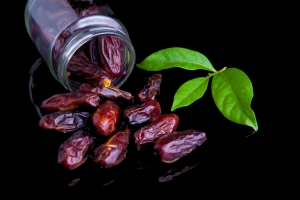20 Powerful Benefits of Pineapple
On the outside, pineapples look uninviting. They are covered in prickly spines. But on the inside, pineapples truly embody the sentiment of “do not judge a book by its cover.” With pineapples, it is truly what is inside that counts.
It might surprise you that pineapples comprise many berries that fuse and form together around a core. Even more surprising is the bounty of health benefits of pineapple you receive every time you eat this unusual tropical fruit. So grab some pineapple slices and read how they will benefit you.
It might surprise you that pineapples comprise many berries that fuse and form together around a core. Even more surprising is the bounty of healthful benefits you receive every time you eat this unusual tropical fruit. So grab some pineapple slices and read how they will benefit you.
1 Highly Nutritious
Pineapple is not only a delicious tropical fruit but also offers a variety of nutritional benefits of pineapple. One of the critical nutrients in pineapple is manganese, which is crucial for antioxidant defenses. This essential mineral plays a role in the proper functioning of many enzymes in the body and helps to protect cells from damage caused by harmful free radicals.
In addition to manganese, pineapples are also rich in vitamin C and thiamin. Vitamin C is a potent antioxidant that can help protect the body from damage caused by oxidative stress and enhance the immune system. Thiamin, or vitamin B1, is essential for energy production in the body. It helps to convert carbohydrates into glucose, which is the body’s primary source of energy.
Incorporating pineapples into your diet can provide these vital nutrients and support your overall health and well-being. Pineapples are an excellent addition to any diet as they are low in calories and fiber and contain no fat. They can be enjoyed in various ways, such as adding them to smoothies and fruit salads or eating them as a snack.
2 Diet-friendly
Trying to lose weight, but your sweet tooth is getting in the way? Try some pineapple for weight loss. This delicious tropical fruit is low in calories and fat, making it an ideal snack for anyone trying to lose weight.
A cup of pineapple chunks only contains 82 calories, significantly lower than other popular snacks like chips or candy. Not only is pineapple low in calories, but it’s also a good source of dietary fiber, which can help keep you fuller for extended periods. Additionally, pineapple fiber can aid digestion, preventing bloating and constipation, which can be common side effects of weight loss diets.
While pineapple contains natural sugar, with about 16 grams per cup, it’s still a better option than the added sugars in many processed foods. The natural sugars in pineapple are balanced by other essential nutrients like vitamin C, which help boost the immune system and promote healthy skin. Pineapple also contains the enzyme bromelain, which has anti-inflammatory properties that can help reduce swelling and aid in recovery after exercise.
3 Supports a Healthy Immune System
Pineapple is an excellent source of vitamin C, with just one serving to provide half of the FDA’s recommended daily intake for this essential nutrient. Vitamin C is a powerful antioxidant that helps to protect the body from free radicals that can cause cell damage and lead to chronic diseases like heart disease and cancer. Additionally, vitamin C plays a critical role in immune system function, helping to stimulate the production of white blood cells that fight off infections and diseases.
In addition to its high vitamin C content, pineapple contains other beneficial nutrients like manganese and thiamin. Manganese is essential for antioxidant defenses and helps support healthy bone development and wound healing. Conversely, thiamin is a B vitamin that helps the body produce energy from food and supports healthy brain function.
Read also – This Is Why Veganism Promotes a Longer Lifespan
4 Strengthens Bones
Pineapple is rich in vitamin C, which boosts the immune system. Vitamin C helps to stimulate the production of white blood cells, which fight against infections and diseases. A cup of pineapple chunks contains approximately 79 mg of vitamin C, more than adults’ recommended daily intake.
5 Keeps Eyes Healthy
Move over, carrots. Pineapples can help keep your eyes healthy too. Pineapples contain antioxidants known as carotenoids, which have been linked to maintaining healthy vision. These antioxidants help to protect the eyes from damage caused by harmful UV rays and prevent age-related vision problems like macular degeneration. Eating more pineapples can also provide your body with other essential nutrients for eye health, such as vitamin C.
Pineapples also contain other beneficial nutrients for maintaining healthy eyesight. These include beta-carotene, vitamin A, and potassium. The body converts beta-carotene into vitamin A, which is essential for proper vision. Potassium helps to regulate fluid balance in the eyes, which is important for maintaining healthy intraocular pressure. This one of the natural anti-inflammatory foods can support overall cardiovascular health.
6 Keeps Digestion on Track
Pineapple is an excellent fruit for promoting regularity and keeping your digestive system functioning smoothly. With its high fiber content and the presence of the digestive enzyme bromelain, pineapple is a powerhouse for improving digestion. The pineapple fiber helps keep things moving through the digestive tract, while bromelain breaks down proteins and improves overall digestion efficiency.
Moreover, combining fiber and bromelain in pineapple can benefit people with digestive issues like bloating and constipation. So if you want to improve your digestive health and stay regular, consider adding more pineapple to your diet.
7 Reduces Inflammation
Bromelain, the enzyme found in abundance in pineapples, has been shown to have powerful anti-inflammatory benefits. Inflammation is linked to various chronic conditions, including arthritis, heart disease, and cancer. Bromelain may help lower the risk of these diseases by reducing inflammation and improving overall health.
Additionally, studies have suggested that bromelain may have anti-tumor properties, with some research indicating that it may be effective in slowing the growth of tumors. While these findings have primarily been demonstrated in animal studies, researchers are optimistic that similar results can be achieved in humans.
Read also – 6 Ways to Healthfully Indulge Your Sweet Tooth
8 Lowers Risks of Blood Clots
Do you fly a lot? Bromelain helps keep the blood from coagulating excessively. Eating more pineapple is smart if you are at risk for blood clots. This is because bromelain, the enzyme found in pineapple, has been shown to have anticoagulant properties, which can help prevent blood clots from forming.
This is particularly relevant for those at increased risk of blood clots due to long periods of sitting or other factors. By incorporating more pineapple into your diet, you may benefit from the anticoagulant properties of bromelain, helping to keep your blood flowing smoothly and reducing your risk of dangerous blood clots. So next time you plan a long flight or are concerned about blood clot risk, consider adding some juicy pineapple to your diet as a natural and delicious preventative measure.
9 Improves Heart Health
Eating pineapple helps maintain a healthy heart due to its high fiber, potassium, and vitamin C content. Pineapple juice has been shown to help reduce the risk of coronary heart disease. In addition, the high potassium content of pineapple helps reduce high blood pressure.
Pineapple fights blood clotting problems thanks to its high bromelain content. Bromelain helps clot clots stick together, thus preventing heart attacks.
10 Boosts Energy
Pineapple’s natural sugars and carbohydrates provide a quick burst of energy to help power you through a workout or a busy day. Unlike processed foods that contain empty calories, the natural sugars in pineapple are accompanied by a wealth of vitamins, minerals, and antioxidants essential for overall health.
In addition to providing a quick energy boost, pineapple also contains high levels of vitamin C, which helps to reduce fatigue and improve overall energy levels. Vitamin C plays a vital role in the production of energy in the body, as it helps to convert glucose into usable energy. So by consuming pineapple, you can help ensure that your body has the nutrients it needs to produce energy efficiently and effectively.
11 Promotes Skin Health
Pineapple’s high vitamin C content makes it a valuable food for promoting skin health. Collagen is a vital component of skin health, providing structure and elasticity to the skin. Vitamin C benefits collagen synthesis by stimulating its production. Therefore, consuming pineapple can help improve skin elasticity, reduce the appearance of fine lines and wrinkles, and promote overall skin health.
Pineapple is also rich in antioxidants, which can protect the skin from damage caused by free radicals. Free radicals are unstable molecules that can cause damage to cells, including skin cells. The antioxidants in pineapple can neutralize free radicals, reducing the risk of oxidative damage to the skin. This can help to maintain healthy skin and prevent premature aging caused by environmental factors like pollution, sun exposure, and smoking.
12 Helps with Weight Loss
A pineapple is an excellent option for those looking for a healthy, low-calorie fruit that won’t cause a sudden spike in blood glucose levels. With its low glycemic index, pineapple is a smart choice for people with diabetes who want to manage their blood sugar levels. Unlike high glycemic index foods, which can cause blood glucose levels to spike and then quickly drop, pineapple offers a more steady and controlled release of glucose into the bloodstream.
Additionally, pineapple is a great option for those looking to maintain a healthy weight or lose weight. With its low-calorie count and high fiber content, pineapple can help you feel fuller for longer, reducing the likelihood of overeating or snacking on unhealthy foods. Including pineapple, one of the diet-friendly fruits in your meals can support your weight loss goals.
13 Lowers Blood Pressure
High blood pressure, also known as hypertension, is a common condition affecting millions of people worldwide. It can lead to serious health problems like heart disease, stroke, and kidney damage. However, consuming pineapple regularly can help to lower blood pressure and reduce the risk of these health issues.
Pineapple contains several beneficial nutrients for cardiovascular health, including potassium and fiber. Potassium is a mineral that helps to regulate blood pressure by balancing the effects of sodium in the body. Sodium is a mineral that can raise blood pressure when consumed in excess. Fiber, on the other hand, helps to reduce cholesterol levels in the body, which can contribute to high blood pressure.
In addition to these nutrients, pineapple contains a group of enzymes called bromelain. Bromelain has anti-inflammatory properties that can help to reduce inflammation in the body, which can also contribute to high blood pressure. Inflammation can cause the blood vessels to narrow, making it harder for blood to flow through them. This can increase blood pressure and put a strain on the heart.
14 Reduces the Risk of Cancer
One of the most promising benefits of pineapple is its ability to reduce the risk of cancer. Cancer is a complex and often devastating disease affecting millions of people worldwide. Pineapple contains a range of nutrients and compounds that have been found to have anti-cancer properties.
Firstly, pineapple contains a group of enzymes called bromelain, which has been found to have anti-inflammatory and anti-cancer properties. In addition, in laboratory studies, bromelain has been shown to inhibit the growth of cancer cells.
Secondly, pineapple is a rich source of antioxidants, which protect cells from damage caused by free radicals. Free radicals are unstable molecules that can damage cells and contribute to cancer development. Foods high in antioxidants, such as pineapple, can help protect against cancer.
In addition, pineapple is also high in vitamin C, which is an important antioxidant that helps to protect cells from damage. Vitamin C has been found to have anti-cancer properties and may help to reduce the risk of certain types of cancer.
Finally, pineapple is a good source of dietary fiber, which has been linked to a reduced risk of colorectal cancer. Fiber helps to keep the digestive system healthy and may also help to reduce inflammation in the body, which can contribute to cancer development.
15 Aids in Wound Healing
Another of the most important benefits of pineapple is its ability to promote wound healing. So whether you have a minor cut or a more serious injury, including pineapple in your diet can help speed up the healing process.
The fact is that pineapple contains a group of enzymes called bromelain, which has anti-inflammatory and wound-healing properties. Bromelain works by breaking down proteins and reducing inflammation, which can help promote faster healing.
In addition to bromelain, pineapple is a good vitamin C source, an essential nutrient for wound healing. Vitamin C plays a crucial role in forming collagen, a protein that helps maintain the structure of tissues and blood vessels. By increasing collagen production, vitamin C can help speed up the healing process and reduce the risk of infection.
16 Boosts Brain Function
Incorporating pineapple into your diet is an easy and delicious way to enhance brain function. Eating pineapple regularly or taking supplements can improve your memory, increase your focus, and enhance your overall cognitive performance.
Pineapple is a rich source of antioxidants, including vitamins C and A, and flavonoids, which protect the brain from oxidative stress caused by free radicals. Bromelain, an enzyme found in pineapple, has anti-inflammatory properties that can reduce inflammation in the brain associated with cognitive impairments. Additionally, the potassium in pineapple helps regulate blood pressure and improve blood flow, delivering more oxygen and nutrients to enhance cognitive function. Foods that boost brain function and antioxidant benefits can significantly improve overall health.
17 Reduces Allergy Symptoms
Pineapple may be an effective natural remedy for seasonal allergies or allergic reactions. Pineapple has various properties that can help to alleviate allergy symptoms.
For instance, it contains bromelain, an enzyme with anti-inflammatory properties that reduces inflammation in the body. Inflammation is a common symptom of allergies, and reducing it can help alleviate symptoms like a runny nose, sneezing, and itchy eyes. Pineapple is also rich in vitamin C, a potent antioxidant that boosts the immune system and reduces the severity of allergic reactions.
Additionally, pineapple contains natural antihistamines that can help to reduce allergy symptoms. Histamines are chemicals produced by the body in response to an allergen and are responsible for causing symptoms like inflammation, itching, and swelling. Immune-boosting foods like pineapple can be beneficial for reducing allergy symptoms.
18 Helps with Joint Health
Pineapple may be an effective natural remedy for those who suffer from joint pain or inflammation. Pineapple contains an enzyme called bromelain, which has anti-inflammatory properties and can help reduce swelling and pain in the joints. Bromelain is also a natural blood thinner and can improve circulation, which can help to alleviate joint pain.
Also, pineapple’s high vitamin C content can help boost the immune system, reducing inflammation and preventing further damage to the joints. Furthermore, its manganese content can help promote healthy bones and joints by supporting collagen production.
19 Reduces the Risk of Asthma
Pineapple can also reduce the risk of asthma. Beta-carotene, which is contained in plant products, including pineapple, can prevent the development of bronchial asthma. Toxins, poor nutrition, environmental pollution, antibiotic abuse, and stress all play a role in developing asthma.
All these factors contribute to the development of inflammation. Fortunately, one of the benefits of pineapple is that it can help reduce the risk of asthma with its beta-carotene and detoxifying abilities.
20 Promotes Hair Growth
While many people use expensive hair products to improve the health and appearance of their hair, adding pineapple to your diet can be an easy and cost-effective way to support hair growth.
Pineapple has numerous benefits for your hair and scalp. It contains vitamin C, which can make hair softer and shinier, while the anti-inflammatory enzyme bromelain can help prevent acne, dermatitis, psoriasis, and eczema.
Additionally, pineapple can thicken hair, making it stronger and less prone to falling out. It also contains enzymes that enrich hair follicles, improving hair density and elasticity.
Finally, pineapple can treat scalp inflammation and prevent unwanted hair loss, providing instant relief from severe itching. Try incorporating pineapple into your diet or using pineapple-based hair products to enjoy these benefits.
Pineapples offer numerous incredible benefits, including reducing mucus buildup in the throat during illness. Therefore, adding this tasty fruit to your daily diet is wise. Nevertheless, it’s vital to remember that pineapple should not replace medical treatment, and it’s essential to consult with a healthcare professional before making any dietary changes or taking supplements.




